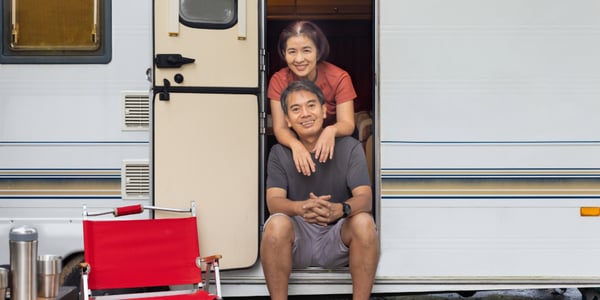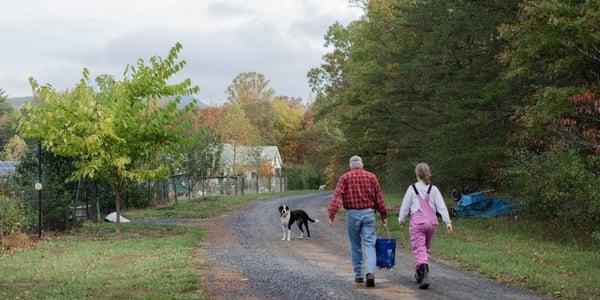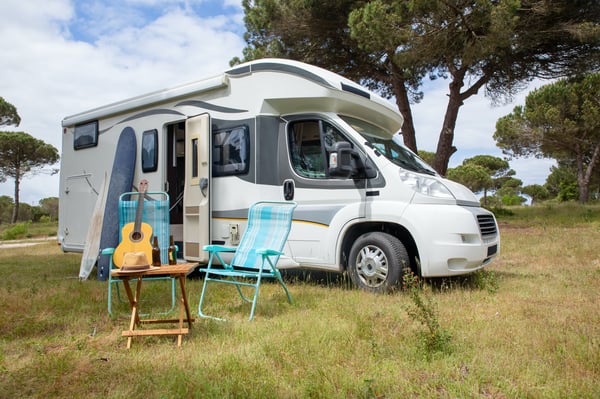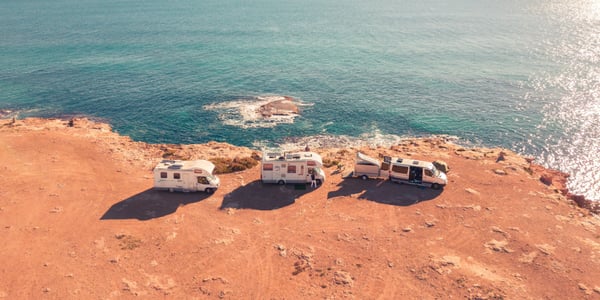There comes a time in most people’s lives when they decide to downsize to a smaller home. Whether...
The Pros and Cons of Retiring in an RV
Have you ever fantasized about living your retirement years on the road in a recreational vehicle? If that's the case, you're not the only one. An estimated one million Americans have decided to retire in an RV and spend at least part of the year traveling. It's not just baby boomer retirees who are doing this. Millennials, some of whom have children, are also embracing life on the road and living a minimalist lifestyle.
Full-time RVers can drive their homes from town to town, live near their grandchildren one month, just outside a bustling city the next, and winter in a warm beachside community. Many retirees and even those currently working, provided they have remote jobs, are attracted to the flexibility and adventure of life on the road. And the majority of full-time RVers adore it.
Living a retired life isn't all roses and butterflies. There are pros and cons to living in an RV!
Pros of Living In An RV in Retirement
There are many great advantages to an RV retirement!-
Affordability
A "real house" (or, as they're known in the RV community, "sticks and bricks") can be costly. Depending on where you live, you must pay rent or mortgage, utilities, and other expenses.
If you choose to RV, your monthly "rent" might be as low as a few hundred dollars. Of course, you can also take out a personal loan to buy the camper entirely and be done with it!
You must, of course, account for campground rent, gas, insurance, and other expenses. However, it should still be more affordable than staying at hotels every night.
In reality, depending on your specific preferences, an RV lifestyle might cost anywhere from $1,400 to $3,000 per month.
-
Spend More Time in Nature
 There's nothing quite like being outdoors! Being in nature lifts your spirits and makes you feel more at ease. It's the reason why so many people enjoy RVing!
There's nothing quite like being outdoors! Being in nature lifts your spirits and makes you feel more at ease. It's the reason why so many people enjoy RVing!You can even go boondocking or dry camping, which means you'll be "off the grid" for a while (no water, sewer, or electric hookups in exchange for staying in some truly remarkable places).
Of course, your RV contains fresh water and sewage holding tanks and a battery and, if desired, a solar hookup, so you'll have access to most of the luxuries and comforts of home even if you're in the middle of nowhere!
-
Travel! You Get To Visit a Lot of Different Places
Are you frustrated with your surroundings? It's no problem! Pack your belongings and hit the trip. Simply travel through different states and stay in some amazing spots during your vacations in an RV. (A personal favorite was Acadia National Park in Maine!)
-
You Go Through A Lot Of Personal Development
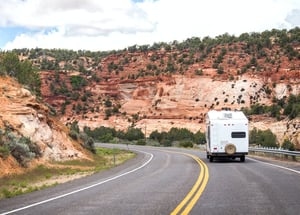 You have a lot of responsibilities when you live on the road. Things break, and you'll soon discover that life doesn't go as planned. You'll have to adjust and figure things out on the go.
You have a lot of responsibilities when you live on the road. Things break, and you'll soon discover that life doesn't go as planned. You'll have to adjust and figure things out on the go.All of the novelty and difficulty encourage you to grow as a person by leaps and bounds, which is a fantastic side benefit!
-
New Folks To Meet
When you live in an RV, there are so many opportunities to meet new people, from other campers (who are usually extremely pleasant) to campground hosts, fellow hikers, kayakers, and more. It can be much simpler to make new friends on the road!
Cons of Living In An RV after Retirement
However, you should consider these reasons an RV retirement isn't for everyone.
-
There isn't a Lot of Space
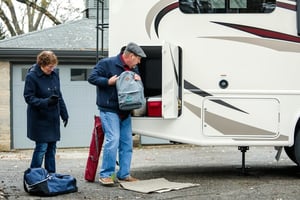 If you're fond of a big kitchen and enjoy cooking elaborate meals, it might not be for you. In the cramped RV kitchen, that's nearly impossible.
If you're fond of a big kitchen and enjoy cooking elaborate meals, it might not be for you. In the cramped RV kitchen, that's nearly impossible.Because of the limited space, you must carefully consider what is worth taking and what is not. There isn't any room for other stuff. It also means that items will grow cluttered quickly, necessitating frequent cleaning.
Oh, and the cramped showers and lack of bathtubs aren't exactly appealing. (Unless you purchase a big vehicle, which can be unpleasant to drive!)
-
Mold and Mildew are Serious Issues
Mold and mildew can quickly grow due to the small space and lack of adequate airflow. Particularly in regions that are difficult to see or access (such as under or behind the shower).
Always, always, ALWAYS get a used rig inspected before you buy it (and I do recommend used because campers lose their value as soon as you drive them off the lot). Move on if they won't let you get it inspected.
-
Every Time You Drive, It's Like an Earthquake
Things will break, shatter, and leak if you drive your house over the interstate at 60+ mph. It's advised to set aside money for repairs because they are unavoidable after a certain amount of time on the road.
It's also a good idea to inspect your vehicle before and after each trip. Examine the seams and corners to check that no water is seeping and that nothing appears to be amiss.
-
Controlling The Climate Can Be Tough
You're essentially trapped in a container with little to no insulation. Even with the air conditioning running, if it's hot and muggy outside, it will be hot and humid inside. Likewise, if it's cold and dry outside, it'll be chilly and dry inside as well.
-
It Might Be Stressful To Drive A Huge Rig
The more space your RV has, the fewer opportunities for parking and the more difficult it is to navigate one-way streets and make quick lane changes on the interstate.
It will not be fun traveling anywhere other than highways in a 32' rig. It's one of the most significant disadvantages of RVing.
Is it a GOOD idea to live in an RV Retirement?
Any type of family vacation may be a big deal, but RV travel has its own set of responsibilities. However, even with some of these concerns, many families find RV travel to be a brilliant way to vacation and live. And renting one can be a terrific way to give it a try. However, you should go in with your eyes wide open.
Learn more about preparing to move on our Housing Resources page!


